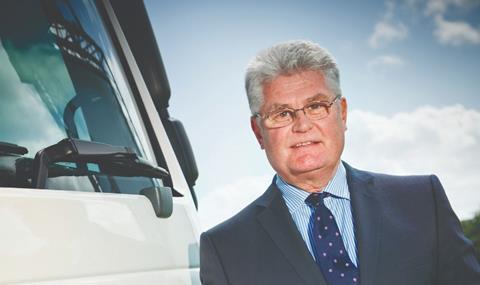
Former MAN Truck and Bus chief executive Des Evans (pictured) has launched a scathing attack on the government’s plans to phase out diesel HGVs from 2035, insisting operators will simply refresh their existing fleets as close as possible to that date and then run them for at least another 10 years.
He told MT the global decarbonisation agenda “goes above the heads” of most operators and is “the automotive equivalent of veganism”, forcing truck makers to produce zero-emission vehicles at prohibitive prices despite little market appetite.
“The majority of those operating 18-tonne trucks and above will not go electric for a generation, and will still have diesel vehicles for the next 10-25 years,” he said. “There will be a massive rush to buy diesel vehicles just before the deadline.
“The biggest issue facing HGV fleet operators is whether decarbonisation is reality or fantasy,” he added. “About 65% of all trucks on the road are 18 tonnes and above. Operators won’t bother with electric. It’s going to cost them big time, and why do it when you’re already under pressure?
“The average margin, if you look at the MT Top 100, is 5% at best on the cost tables. The economics to go electric just don’t stack up, it’s unworkable."
Evans said most operators struggle to monitor the fuel consumption of their fleets, which is about 40-45% of their overall costs: “If they could control it by half a mile per gallon they would double their bottom line profitability,” he claimed. “So when you talk to them about decarbonisation, they wouldn’t have a clue what we were talking about! We need to demystify this.”
Evans went on to argue that the widespread “demonisation of diesel” amid the drive to decarbonise was innacurate and misleading.
“The vegan drumbeat was very loud over the last five or 10 years but look at what’s happening now,” he said. “The whole world has not become vegan and it won’t happen with net zero either.
“We should stop listening to Swedish truants like [environmental activist] Greta Thunberg. It amuses the hell out of me that so called leaders of the world – the UN – parade a 17-year-old Swedish truant as if she’s got the answers. It’s just pathetic.
"The climate is changing for sure but it has been for the last 4.5 billion years. On the other side of the argument, CO2 is as important as oxygen. We need it to make the plants grow.
Read more
- The road to net zero emissions is beset with fallacies and myths – but a solution is at hand
- Renault Trucks MD calls on UK to “walk the talk” on electric vehicles
- CTS Hire adds 10 diesel RCVs to fleet as electric options lose their spark
"The whole thing is clouded in really poor information about the performance of the current advanced diesel engines, and the truck manufacturers are being forced into this," Evans repeated. "It would take 100 44-tonne tractor units running on Euro-6 diesel engines to emit the same emissions as one Euro-4 vehicle from 15 years ago.
“You can reclassify them as air fresheners because the air coming out is cleaner than when it went in. We’re trying to change a 100-year-old business model. If you look at the history of the internal combustion engine it's created wealth and prosperity for the whole globe but is now being denigrated.”
Evans has recently co-authored a book on the subject entitled ‘The Road to Zero Emissions – The Future of Trucks, Transport and Automotive Supply Chains’. He said the biggest drawbacks facing operators remained cost, range, weight and infrastructure.
“The average price of a 44-tonne tractor unit is £120,000,” he said. “An electric replacement would be £360,000 - and an experimental one at that. It’s also two tonnes heavier and won’t have more than a 400-mile range.
“The bottom line for me is that last year about 37 billion tonnes of CO2 was emitted globally. About 23% of it comes from transport, but 80% of it comes from four countries – India, China, Russia and the USA.
“The UK emitted 360 million tonnes of carbon last year. That’s one percent. If we went net zero tomorrow it wouldn’t make one bit of difference to what’s happening on the planet. People have got to get more realistic. Target more on waste. Target more on the fact that there’s more noxious emissions emitted by the 1.5 billion cattle on the planet. Why don’t we get rid of them and go to a plant-based diet?”
Speaking prior to news that Tata Group, the owner of Jaguar Land Rover, is to invest £4bn to build an electric battery gigafactory in the UK, Evans said the wider automotive industry was facing a cliff edge if it didn’t address the drive to go electric.
"Worryingly, the UK used to be the world leader in automotive design, development and production, but over the years we’ve exported that,” he said.
“We need to establish a minimum of three 35 gigawatt battery production sites, which would take five years. The cost would be around £10bn-£11bn and we are nowhere near it. That industry is facing oblivion and nobody has done anything about it.”
For more stories tracking the industry journey to decarbonisation see our new Freight Carbon Zero website.














